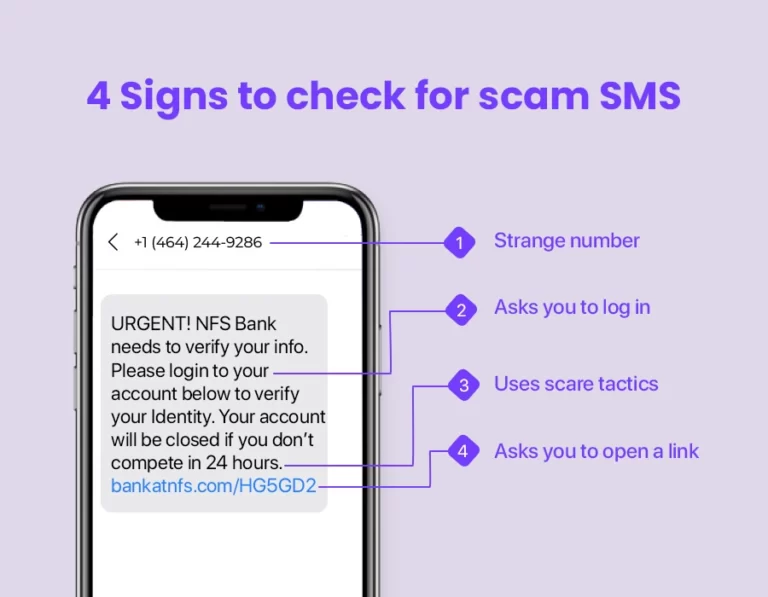- Admin@nettyfish
- fake text message, fraud text message, text message scams
- 0 Comments
- 4029 Views
Stop SMS Scams! In 2023, more than 58% of reported cases involved fake text messages, with an alarming 1 in 3 Americans falling victim to scams embedded in these deceptive messages. Recognizing the signs of a potential text message scam is crucial, as fake messages can lead to severe consequences, ranging from financial fraud to identity theft. In this comprehensive guide, we’ll delve into the distinctive indicators that can help you identify fake text messages and provide essential strategies to protect yourself from falling prey to these scams.
Understanding the Spread of Fake Text Messages
Fake text messages are persistent due to their broad reach, enabling scammers to profit even if a small fraction of recipients fall into their schemes. Scammers exploit the fact that while most individuals can receive text messages, they may struggle to differentiate between genuine and fake ones. Consequently, scammers cast a wide net, sending thousands of texts to potentially active numbers, hoping to trap an unsuspecting victim.
These fraudulent messages typically aim to extract various types of sensitive information, including personal details (name, address, phone number, social security number), financial data (credit card numbers, bank account details, passwords), login credentials for online accounts (email, social media), personal health records, geolocation data, and other information that can be exploited for identity theft or fraudulent activities.
Identifying Fake Text Messages: Common Indicators
Even though scammers employ various tactics in crafting fake text messages, certain indicators are commonly shared. Here’s a guide on recognizing a fake text message, regardless of whether it arrives via SMS, a dedicated messaging app, or another social platform.

1. Analyzing the Sender's Information
- Odd Numbers: Be cautious of messages from numbers with extra or repeating digits, as scammers often use patterns like 1234567890 or 9999999999.
- Alphabet Senders: Exercise caution if the sender’s name consists only of letters (e.g., “AMAZON”), as scammers may mimic legitimate businesses to appear authentic.
- Foreign Country Codes: Be wary of messages from other countries, especially if unexpected.
2. Checking Links and Attachments
- Be vigilant when receiving messages with links or attachments, especially from unknown senders.
- Carefully examine web addresses for unusual or misspelled parts.
- Avoid opening links or downloading attachments from unverified sources.
3. Random Rewards
- Be skeptical of messages claiming you’ve won a prize, especially if you haven’t entered any contests recently.
- Question messages offering incredible discount deals or prizes that seem too good to be true.
4. Irrelevant Messages
- Scammers often send generic, automated messages unrelated to your interests or activities.
- Be cautious of notifications about unexpected package deliveries or offers to buy/sell items.
5. Urgency in Messages
- Messages insisting on immediate action or response are a significant red flag.
- Scammers create urgency by claiming a crisis, posing as government agencies, or alarming you about your bank account.
Types of Fake Text Messages

1. SMS Phishing (Smishing)
Definition: Smishing involves using deceptive text messages to trick individuals into revealing sensitive personal and financial information.
Cautions: Be wary of texts impersonating legitimate entities like banks or government agencies. Scammers use manipulated conversations to steal data, login credentials, or money.
2. Tax Refund Scams
Cautions: Scammers may claim you’re owed a tax refund, urging you to click a link or reply. Genuine government agencies don’t request information or fees via unsolicited text messages.
3. Scams Posing as Your Bank
Cautions: Genuine banks won’t request personal or financial details via text messages. If unsure, contact your bank directly and avoid clicking on any provided links.
4. Package Delivery Alerts
Cautions: Legitimate shippers don’t ask for personal information or payments to complete a delivery. Exercise caution with unexpected requests related to package deliveries.
5. Apple ID Verification
Cautions: Messages attempting to verify your Apple ID or other tech accounts should raise suspicion. Verify directly with the company and promptly change passwords if necessary.
6. Job Offer Scams
Cautions: Scammers prey on job seekers with deceptive job offers. Legitimate recruiters won’t ask for money or require clicking on links to secure a job.
Protecting Yourself from SMS Scams
- Do Not Respond: Avoid responding to fake text messages, even with a “STOP.” Responding may confirm your phone number’s activity, leading to more unwanted messages.
- Block the Sender: Most smartphones block specific numbers or senders, preventing further contact.
- Report the Message: Inform your mobile carrier or relevant authorities, such as Cyber Crime, about suspicious text messages.
- Use Security Software: Ensure your smartphone has updated security software to guard against malware and potential threats.
- Avoid Clicking on Unknown Links: Refrain from clicking on links from unknown sources until you’ve verified their authenticity.
- Exercise Caution with Personal Information: Be prudent when providing personal information and verify requests through official channels.
- Regularly Update Devices: Keep your devices updated to stay protected from evolving threats.
- Clear Browsing History and Cache: Remove potential malware by regularly clearing your browsing history, downloads, and cache.
- Utilize Security Tools: Employ tools like “haveibeenpwned.com” to identify, prevent, and evade SMS scams, safeguarding personal and financial security.
Reporting SMS Scams
- Contact Your Mobile Carrier: Reach out to your mobile carrier through email, text, or phone call to report scam messages.
- Report to Authorities: Report scam messages to the cybercrime department via mail or the official website.
Conclusion
Staying vigilant, questioning the legitimacy of messages, and following these strategies are crucial steps in protecting yourself from the rising tide of fake text messages. By arming yourself with knowledge and adopting proactive measures, you can significantly reduce the risk of falling victim to these deceptive schemes.
Are Looking to streamline your business SMS Campaigns? Acquiring a dedicated phone number for your company can enhance customer interaction and minimize the risk of spam attacks. Moreover, it also adds an extra layer of security against spammers/scammers attempting to impersonate your company. Nettyfish Solutions, the best bulk SMS service provider in India offers to help businesses simplify their communication and optimize SMS Campaigns.





